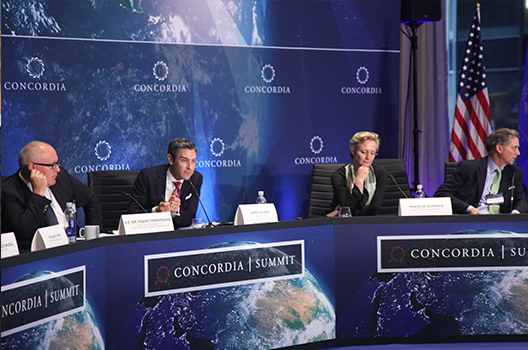 On September 19, 2016, the Atlantic Council convened top transatlantic leaders for an invitation-only strategic dialogue on the future of Europe at the Concordia Summit in New York City on the margins of the United Nations General Assembly. At a time when the foundations and principles of a united, strong, and coherent Europe risk being rolled back by sharp political divisions, mistrust in institutions, demagogy, and xenophobia, these leaders engaged in a serious discussion to identify the leadership and strategies required to reanimate the vision of a strong Europe allied to a globally-engaged United States.
On September 19, 2016, the Atlantic Council convened top transatlantic leaders for an invitation-only strategic dialogue on the future of Europe at the Concordia Summit in New York City on the margins of the United Nations General Assembly. At a time when the foundations and principles of a united, strong, and coherent Europe risk being rolled back by sharp political divisions, mistrust in institutions, demagogy, and xenophobia, these leaders engaged in a serious discussion to identify the leadership and strategies required to reanimate the vision of a strong Europe allied to a globally-engaged United States.
To open the dialogue, H.E. Frans Timmermans, first vice-president of the European Union Commission, offered remarks on “The Challenge: Europe in Crisis”. Mr. Richard Wike, director of global attitudes research at Pew Research Center, followed with commentary on “The Public: Attitudes in Europe and on the European Union.” Dr. Alina Polyakova, deputy director of the Dinu Patriciu Eurasia Center at the Atlantic Council, helped set the scene further with remarks on “The Drivers: Understanding and Harnessing Public Attitudes.“ Ms. Marietje Schaake, member of European Parliament, offered a perspective on “The Response: Holding Europe Together by Galvanizing the Core.”
The discussants forged strategies to help make the case for political and economic globalization; mobilize change agents as a countermovement to tides of populism; reform the EU to address mistrust in institutions, pessimism about the future, fear of terrorism, and resentment of economic stagnation; and adapt to the rising number of irregular migrants and refugees. They discussed the impact of Britain’s exit from the EU on international markets and trade; the Transatlantic Trade and Investment Partnership and its effect on European and American growth as well as the upcoming US elections on American relations with Europe.
Image: H.E. Frans Timmermans, first vice-president of the European Union Commission (left), Mr. Damon Wilson, executive vice president for programs and strategy of the Atlantic Council (middle), and Ms. Marietje Schaake, member of European Parliament (right), lead a strategic conversation on the future of Europe at the 2016 Concordia Summit in New York City on the margins of the United Nations General Assembly.
